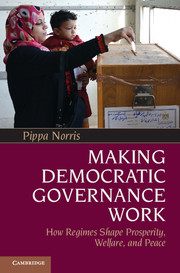8 - Conclusion
Why Regimes Matter
Published online by Cambridge University Press: 05 November 2012
Summary
Have processes of democratization during the third wave era led to concrete gains in economic growth, human welfare, and security, as the proponents of democracy-promotion suggest? Alternatively, has the spread of “good governance” encouraged development, as state-builders argue? Should our understanding of these relationships be reversed, as skeptics claim, if gradually rising levels of societal modernization, or achieving a certain threshold of per capita GDP or human capital, provide the foundation for subsequent improvements in both democracy and governance? Or should we seek to disentangle the interlinked processes strengthening development through advances in both democracy and good governance, within the constraints of structural conditions?
As discussed throughout this book, the varied thinkers who subscribe to the democracy-promotion viewpoint commonly make two core claims favoring this type of regime. Firstly, idealists argue on normative grounds that legitimate governance should be based on the will of the people, as expressed through the institutions of liberal democracy. These claims are embodied in international conventions, agreed on by the world’s governments, notably Article 21 of the 1948 Universal Declaration of Human Rights: “The will of the people shall be the basis of the authority of government.” Human rights–based arguments reflect universal claims, hence it is believed essential to deepen liberal democratic institutions in every society, as exemplified by holding multiparty elections as part of the peace-building process to establish a legitimate government in fragile states such as the Democratic Republic of Congo, Sudan, Iraq, and Afghanistan. Rights-based arguments reflect powerful moral claims that resonate widely among those sharing democratic values.
- Type
- Chapter
- Information
- Making Democratic Governance WorkHow Regimes Shape Prosperity, Welfare, and Peace, pp. 187 - 196Publisher: Cambridge University PressPrint publication year: 2012



